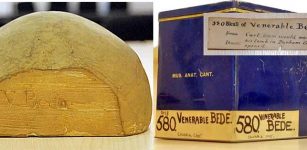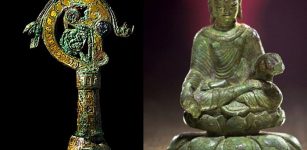Why Was It Necessary For Great Physician Hippocrates To Eat Earwax?
AncientPages.com - Was it really necessary for great physician Hippocrates to eat earwax? Why did he do it?
Hippocrates of Kos (c 360-375 BC) was known as the Father of Medicine. He was a Greek physician, one of the most outstanding figures in the history of medicine.
He came from a family of doctors and underwent the medical training at the local “asclepeion” temple – where priests treated the sick people using snake worship, religious magic, dream interpretation and other superstitions. Hippocrates was against it!
He rejected their methods and supernatural explanations for diseases, and argued for a rational explanation for them. He was convinced that a disease was a natural process (a part of nature) and the symptoms and signs of it, were caused by the natural reactions of the body.
See also:
Defixiones: Ancient Roman Curse Tablets Became Big Business
Therefore medical observation should be performed scientifically with no relation to supernatural explanations. Disease was the result of imbalances in these elements caused by diet, climate, living habits of a sick and had absolutely nothing to do with magic or interfering of gods.
But how could such a good physician as Hippocrates know, how to diagnose what troubled a patient?
He recommended the analysis of urine, vomit, sweat and earwax and was even prepared to taste some of them.
Hippocrates suggested that bitter earwax was a sign of good health, but sweet earwax was a sign of illness.
He was against harmful practices and barbaric treatments of patients and preferred a cautious, gentle approach to a patient and his illness. He demanded high standards of ethics from those who followed his teachings.
Hippocrates’ great tradition survived until today. All modern doctors continuously honor Hippocrates’ name by taking a Hippocratic Oath to do no harm.
It is believed that the Hippocratic Oath is the first version of the code of ethics for physicians.
Copyright © AncientPages.com All rights reserved. This material may not be published, broadcast, rewritten or redistributed in whole or part without the express written permission of AncientPages.com
More From Ancient Pages
-
 Archaeological Evidence Of Human Presence In America 250,000 Years Ago?
Featured Stories | Mar 5, 2024
Archaeological Evidence Of Human Presence In America 250,000 Years Ago?
Featured Stories | Mar 5, 2024 -
 Forbidden Knowledge: Secret Ancient Gates Of The Shining Ones – More Surprising Discoveries – Part 3
Featured Stories | Jul 19, 2019
Forbidden Knowledge: Secret Ancient Gates Of The Shining Ones – More Surprising Discoveries – Part 3
Featured Stories | Jul 19, 2019 -
 Boomerangs Were Used To Shape Stone Tools By Aboriginal People
Archaeology | Aug 16, 2022
Boomerangs Were Used To Shape Stone Tools By Aboriginal People
Archaeology | Aug 16, 2022 -
 Unraveling The Mystery Of How Our Ancestors Created The First Spoken Words
Archaeology | Dec 6, 2021
Unraveling The Mystery Of How Our Ancestors Created The First Spoken Words
Archaeology | Dec 6, 2021 -
 On This Day In History: The Battle Of Actium – Sep 2, 31 BC
News | Sep 2, 2016
On This Day In History: The Battle Of Actium – Sep 2, 31 BC
News | Sep 2, 2016 -
 Roman ‘Backwater’ Challenges Major Assumptions About The Ancient Empire’s Decline
Archaeology | Dec 12, 2023
Roman ‘Backwater’ Challenges Major Assumptions About The Ancient Empire’s Decline
Archaeology | Dec 12, 2023 -
 Medieval Burial Mystery: Enigma Of Missing Bones Of The Venerable Bede
News | Sep 10, 2015
Medieval Burial Mystery: Enigma Of Missing Bones Of The Venerable Bede
News | Sep 10, 2015 -
 Unlocking The Secrets Of Lost Prehistoric Land Hidden Beneath The Sea
News | Sep 8, 2015
Unlocking The Secrets Of Lost Prehistoric Land Hidden Beneath The Sea
News | Sep 8, 2015 -
 On This Day In History: Battle of Tsushima Was Fought – On May 27, 1905
News | May 27, 2016
On This Day In History: Battle of Tsushima Was Fought – On May 27, 1905
News | May 27, 2016 -
 Looted Green Coffin Of Ancient Egyptian Priest Returned To Egypt From US
Archaeology | Jan 2, 2023
Looted Green Coffin Of Ancient Egyptian Priest Returned To Egypt From US
Archaeology | Jan 2, 2023 -
 Easter Island Holds Clues To The Disappearance Of People On The ‘Mystery Islands’
Archaeology | May 14, 2021
Easter Island Holds Clues To The Disappearance Of People On The ‘Mystery Islands’
Archaeology | May 14, 2021 -
 Timboholm Great Golden Treasure Dated To Iron Age’s Great Migration Period
Artifacts | Oct 19, 2018
Timboholm Great Golden Treasure Dated To Iron Age’s Great Migration Period
Artifacts | Oct 19, 2018 -
 Mystery Of Lady Of Elche – Puzzling Artifact Of An Unknown Queen Or Priestess
Artifacts | May 22, 2014
Mystery Of Lady Of Elche – Puzzling Artifact Of An Unknown Queen Or Priestess
Artifacts | May 22, 2014 -
 The Helgö Treasure: Bronze Buddha Statue, Coptic Scoop And A Crozier Depicting Biblical Tale Of Jonah
Artifacts | Mar 10, 2023
The Helgö Treasure: Bronze Buddha Statue, Coptic Scoop And A Crozier Depicting Biblical Tale Of Jonah
Artifacts | Mar 10, 2023 -
 Unknown Ancient History Of Antarctica And It’s Lost Civilization – Secrets Beneath The Ice
Featured Stories | Sep 7, 2015
Unknown Ancient History Of Antarctica And It’s Lost Civilization – Secrets Beneath The Ice
Featured Stories | Sep 7, 2015 -
 Lost Ancient Pyramid City As Big As Manhattan Discovered In Mexico
Archaeology | Feb 17, 2018
Lost Ancient Pyramid City As Big As Manhattan Discovered In Mexico
Archaeology | Feb 17, 2018 -
 Discovery In Alabama Reveals Evidence Of Skull Surgery In North America Thousands Of Years Earlier Than Previously Thought
Archaeology | Apr 2, 2022
Discovery In Alabama Reveals Evidence Of Skull Surgery In North America Thousands Of Years Earlier Than Previously Thought
Archaeology | Apr 2, 2022 -
 Cyrus The Great Cylinder – Legacy Of The Ancients
Artifacts | Aug 25, 2015
Cyrus The Great Cylinder – Legacy Of The Ancients
Artifacts | Aug 25, 2015 -
 Unravelling The Mystery Of Apollonius Of Tyana – Was He A Superhuman?
Featured Stories | Sep 17, 2015
Unravelling The Mystery Of Apollonius Of Tyana – Was He A Superhuman?
Featured Stories | Sep 17, 2015 -
 Unexpected Discovery Of Huge Iron Age Roundhouse At Dinas Dinlle, Wales
Archaeology | Sep 9, 2019
Unexpected Discovery Of Huge Iron Age Roundhouse At Dinas Dinlle, Wales
Archaeology | Sep 9, 2019

